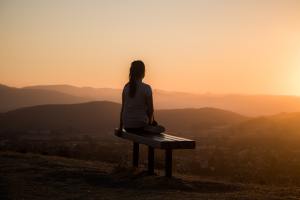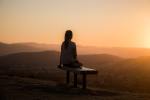
From the darkness of the pandemic, the world is reawakening. Previously empty streets buzz with life. Friends and families are reunited, and people once again travel the world. It’s like seeing spring burst into unimagined life after the harshest of winters.
Almost two years have passed since I published Life in Lockdown: What Matters When All Is Lost. In it I wrote of a world without weddings and funerals; a world clouded by separation from loved ones and the loss of everyday freedoms. The level of restriction endured by everyone was punishing, and I’m glad that, for the majority of people, such hardship is now at an end.
But there are those of us for whom normality remains a distant dream; those of us for whom lockdown never really ended. We, the clinically vulnerable*, live in a parallel universe where caution is still threaded through every day and where, for many, isolation is ongoing. It can be a lonely place. And the loneliness stems not so much from the continued physical separation from the world, as from the sense of being completely forgotten.
It is rare nowadays to hear mention of the clinically vulnerable. It as though we, along with the virus, have miraculously disappeared. And yet we are still very much here, existing in an inverse world where every restriction lifted makes our lives more complex, rather than more straightforward.
It is upsetting to hear politicians and the media talk of ‘learning to live with’ the virus, while failing to acknowledge how that must vary depending on personal circumstances. Learning to live with a virus when it poses little threat to one’s personal well-being is one thing; learning to live with it when there is a good risk of life-changing consequences is quite another. As society returns to normal and all protective measures are dismantled, complex decisions are faced by those for whom covid is not akin to a bad cold. It is painful when that reality is dismissed; when it is implied that carrying on as normal is simply a matter of choice now. A recent BBC News article made a relatively rare acknowledgement of the clinically vulnerable, but referred to us as those who are ‘still worried’ about covid – as though state of mind were the primary issue at play.
Learning to live with a virus when it poses little threat to one’s personal well-being is one thing; learning to live with it when there is a good risk of life-changing consequences is quite another.
Vaccinations have undoubtedly changed the severity of covid at a population level. But there are many people who are either too ill to receive the vaccine, or whose bodies are incapable of mounting an immune response to it. Even for the clinically vulnerable who have been successfully vaccinated, the virus still poses substantial risks.
In my own case, my body’s history with viral illness is not reassuring. It was a virus (or my body’s reaction to it) that triggered my illness when I was twelve. After being transformed, in a few short months, from a happy, active child to one on the brink of death, I can never be casual about viral illness. Three decades later I am still profoundly ill, and routine viruses have the power to completely floor me. It’s not unusual for a simple cold to set me back for a month or more; when I caught flu in 2001, it took over ten years for me to regain my previous level of functioning. I have no idea how my body would react to covid, but it’s reasonable to assume that it could cause a lasting relapse.
Learning to live with covid for me means weighing up how much I am willing to risk the substantial but fragile progress I have spent thirty years making; and balancing that against the impact of continuing to isolate. The consequences affect not only me but also my mother, who lives under huge restriction for my protection. It is an unenviable decision to have to make, and one that would be less painful if there were greater recognition that people like me, and households like ours, exist. Instead there appears to be a widespread implication that if we all pretend hard enough, the pandemic will be over.
It is particularly alarming to think of the removal of compulsory isolation for those infected with covid, the loss of free lateral flow tests and the ending of surveillance surveys such as ONS – all seen as the next steps here in the England. Soon we will not even be able to assess the level of risk that we are facing.
There appears to be a widespread implication that if we all pretend hard enough, the pandemic will be over.
Much of the discussion around covid has been reduced to binary options, which fail to allow room for nuance between the extremes. Covid itself has been framed as a simple life or death equation, where the welcome fall in the rate of the latter is interpreted as a sign that there is no threat to the former. (The risk of long-term, disabling illness being largely overlooked.) Similarly, political response to the pandemic appears to have swung from lockdown to the abandonment of all protective measures, with no middle ground that considers everyone’s needs. There is a glaring lack of consistent, scientifically-based support and advice for those with pre-existing conditions. Two years into a global pandemic, this is a terrible indictment of those in charge.
A simple change to the language used by politicians and the media would in itself make a difference. At present the message being given is that the pandemic is all but over, and that we can and should return to pre-2020 living. Not only is this in direct contradiction to advice given by the World Health Organisation and leading scientists, it is a denial of the reality faced by many thousands of clinically vulnerable people. It creates a sense of alienation and shame for those of us unable to join the rush back to normality. I was speaking to a friend recently, and we both agreed that we are now reluctant to admit that we are still shielding. The prevailing ‘covid is over’ narrative creates a sense of making an unnecessary fuss if one still approaches the pandemic with caution. Yet caution is sensible and necessary – arguably for everybody, and certainly for those whose bodies are already compromised.
It is too often assumed that the clinically vulnerable had such woeful existences already, that covid restrictions have made little impact. This is very far from true. Those with serious health conditions cover a rich spectrum of careers, lifestyles and interests. Many led full and active lives before the pandemic. Others, like me, were far more limited, but still living lives of purpose and value. In many ways that hasn’t changed. My life continues to be happy and meaningful, even under the most difficult of circumstances. I take pleasure in the smallest of things often overlooked by others: pastel cloud formations in a winter sky; streaky sunlight painting patterns on a wall. I remain connected to the world in creative ways, maintaining close relationships from a distance. I’ve learnt that young children in particular love the inventiveness that my circumstances require, even down to games of pass the parcel played from separate houses. I make the most of every day and my life goes on.
But the loss of much that I treasured – trips out to public places, close physical contact with my nieces, visits from friends – has been very hard. The future feels uncertain and difficult. And perhaps most difficult of all is knowing that, with appropriate support, guidance and consideration, it could have been different. Still very challenging – but without the same sense of being isolated and forgotten by the world.

*In the UK, two separate categories exist: clinically vulnerable and clinically extremely vulnerable. For the purposes of this post I have used ‘clinically vulnerable’ as an umbrella term covering both categories.
I have written several times previously on the covid-19 pandemic:
Life in Lockdown: What Matters When All Is Lost
The Uncertainty of Life After Lockdown
Seeking Peace in a World of Uncertainty
What Freedom Day Means for Those Who Aren’t Free
Image credit: Sage Friedman on Unsplash
Image description: A silhouetted figure sits on a bench, looking out over hills. The sun is setting over the scene.
